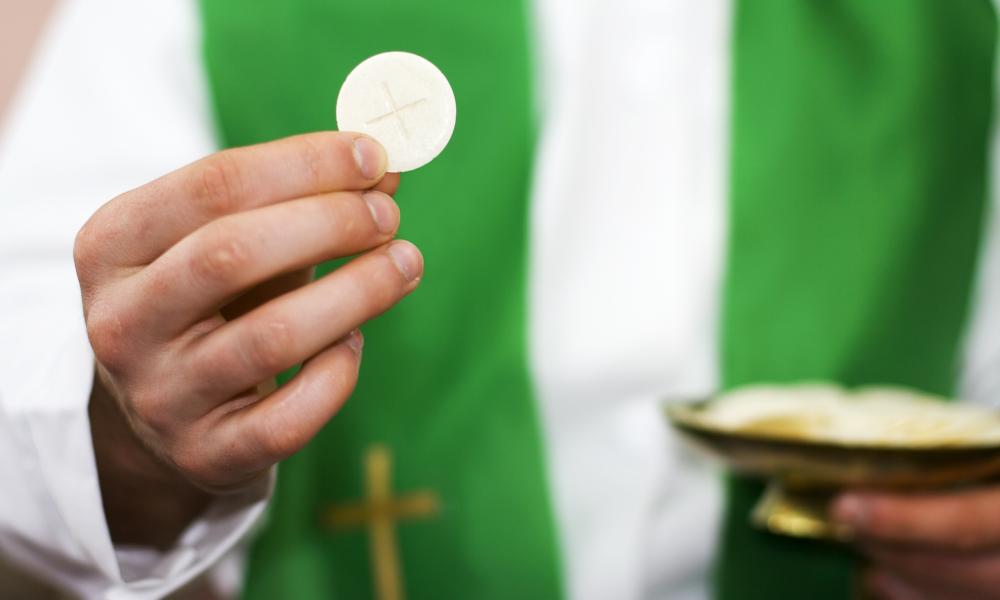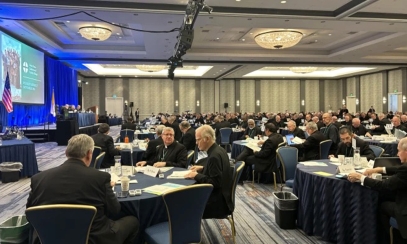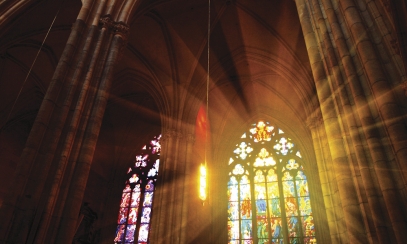
Christ’s Real Presence in the Eucharist is Both a Gift and a Grace
In recent weeks, there has been much dialogue leading to serious debate regarding the practice of whether or not to administer Communion to pro-choice Catholic politicians. Many media outlets reported that the vote during the June Bishops’ Assembly on the drafting of a teaching “Document on the Meaning of the Eucharist in the Life of the Church” was meant to be a justification to deny Communion to all Catholic politicians who are not aligned with Church teaching, especially when it comes to the abortion issue.
The United States Conference of Catholic Bishops stated that it was not up for debate to vote on banning politicians from receiving the Eucharist, nor was there going to be a national policy on withholding Communion from politicians, regardless of whether they hold public office or not.
In recent weeks, there has been much dialogue leading to serious debate regarding the practice of whether or not to administer Communion to pro-choice Catholic politicians. Many media outlets reported that the vote during the June Bishops’ Assembly on the drafting of a teaching “Document on the Meaning of the Eucharist in the Life of the Church” was meant to be a justification to deny Communion to all Catholic politicians who are not aligned with Church teaching, especially when it comes to the abortion issue.
The United States Conference of Catholic Bishops stated that it was not up for debate to vote on banning politicians from receiving the Eucharist, nor was there going to be a national policy on withholding Communion from politicians, regardless of whether they hold public office or not.
The purpose of the teaching document comes from a major concern regarding declining Mass attendance, as well as the declining belief and understanding of the Eucharist among the Catholic faithful. A 2019 Pew poll reveals that only about 30 percent of U.S. Catholics believe in the real presence of Christ in the Eucharist. Creating such a document also is part of the bishops’ strategic plan for 2021-2024 and will serve as a foundation for the multi-year Eucharistic Revival Project, a major national effort to reignite Eucharistic faith in our country.
We also know that less than 25 percent of Catholics in the United States— and even fewer in Europe— attend the celebration of the Eucharist on a regular basis. The COVID-19 pandemic continues to have an impact on Mass participation across the country. In the Diocese of Saginaw, the Mass count taken in May indicates that more than 9,000 people have not yet returned to Mass compared to pre-COVID times.
One could ask, “What has gone wrong?” It is too complex of an issue to address here. Every family knows people who no longer regularly attend Mass or have fallen away from the Church altogether.
Encounter Love itself
Understanding the Eucharist leads to a personal encounter with Love itself. In the words of Archbishop Fulton Sheen: “The greatest love story of all time is contained in a tiny white Host.”
“Once you understand the Eucharist, you can never leave the Church. Not because the Church won’t let you, but because your heart won’t let you.”
These words by an unknown author reveal the heart of the great mystery we celebrate. The greatest event in human history flows from the depth of the Father’s love for us in the suffering, death and resurrection of Jesus Christ. In giving away his Son, the Father’s only and deepest desire is to have a relationship with those whom he has called his own – each and every one of us.
As the mystical Body of Christ, we gather to experience this reality in the celebration of the Most Holy Eucharist in our Catholic communities. Far from being merely an event we attend, it is here, in this sacramental moment, where each of us is drawn into this great mystery of love.
Because sin has entered into the world, humanity has fallen far from God’s graces, keeping us from that original holiness and thus subjecting us to “eternal” death. Our Catholic faith proclaims “good news” and gives us an answer of hope that death does not have the last word. God’s compassion toward us and His mercy are infinite. God has proved His love for us. While we were still sinners Christ was sent into the world by the Father to die for us (Rom 5:8). “How much more then, since we are now justified by his blood, will we be saved through him from the wrath (Rom 5:9).”
Christ’s sacrifice re-presented
Through his death on the Cross, Jesus presented to the Father in heaven his perfect homage and obedience as reparation for humanity’s disobedience and sin. Jesus offered himself on the Cross for each of us, fulfilling his own words, “No one has greater love than this, to lay down one’s life for one’s friends (Jn 15:13).” Christ’s complete act of charity towards humanity allows us the opportunity to re-establish an authentic relationship with the Lord and grow towards that original holiness.
This saving action of Jesus Christ is re-presented each time the Eucharist is celebrated. “It is Christ himself, the eternal priest of the New Covenant who, acting through the ministry of the priest, offers the Eucharistic sacrifice. And it is the same Christ, really present under the species of bread and wine, who is the offering of the Eucharistic sacrifice.”1
The Second Vatican Council proclaimed that the Eucharistic sacrifice is “the source and summit of the Christian life”.2 The Church draws her very life from the Eucharist. The other sacraments and all the works of the Church flow from and are directed toward this great mystery.
Mission of love and mercy
The Church’s mission, our mission, flows from the mission of Christ: “As the Father has sent me, even so I send you” (Jn 20:21). From the Eucharist, the Church draws her spiritual power and then is sent on mission to “go therefore and make disciples” (Matt 28-19). The Eucharist comes to be “both the source and the summit of all evangelization, since its goal is the communion of mankind with Christ and in him with the Father and the Holy Spirit.”3
Our union with Christ in the Eucharist, both a gift and grace, makes it possible for us to fully embrace his mission of love and mercy. When we come to understand this great mystery celebrated in the Eucharist and participate fully each time we gather, our lives will never be the same. We come to understand more deeply the Father’s love for us in Christ Jesus. Our desire for spiritual union with the Lord deepens. Our own sacrificial love intensifies and expands. Our aspiration to serve the Lord grows. These are the very fruits of our Holy Communion.
Dear brothers and sisters, I have often thought of how the Lord Jesus desires to bring us, individually and communally, deeper into this love relationship. When we deeply encounter Love, we are transformed by it, and become like the Lover.
Nourishment that transforms us
As shepherd of the Diocese of Saginaw, I long to help others come to know and experience Jesus in a more personal and life-changing way, especially through the celebration of the Sunday Mass. I invite those who have yet to return to the celebration of the Eucharist to do so— not for my sake, but for yours. Your eternal life depends upon it.
The Eucharist, the Church’s greatest treasure, is to our spiritual life what food and water are for our physical life. If our spiritual life is not attended to, our faith can “become like smoldering cinders or embers – weakened by sin and secularism. It must be reawakened, fanned into flame. We must help Christians to encounter, once again, this Jesus, especially those who have left the Church.”4
By giving the Eucharist the prominence it deserves in our lives, we will show that we are attentive to the importance of the greatness of this gift Jesus left us. The Holy Eucharist brings us into communion with him, enabling us to live with him in the life of the Trinity, and to not only be transformed by this love, but, with him, to transform the world through our lives made holy by this union.
We must remember that we are never alone, because through the humble signs of bread and wine, changed into his Body and Blood, Christ walks beside us as our food for the journey, strengthening us to become witnesses of love and hope for the world.
Let us not forget Mary, Mother of the Eucharist. We ask her to intercede for us and assist us in meeting her Son in the Eucharist. Every time we approach Jesus in the Holy Sacrifice of the Mass, we turn to her who received the lifeless body of her son, and so received Christ’s sacrifice for the whole Church. In her, the world is renewed in Christ’s love. Mary, Mother of the Eucharist, pray for us.
1 Catechism of the Catholic Church, 1410.
2 Second Vatican Ecumenical Council, Dogmatic Constitution on the Church Lumen Gentium, 11.
3 Second Vatican Ecumenical Council, Decree on the Life and Ministry of Priests Presbyterorum Ordinis, 6.
4 Archbishop Rino Fisichella, Pontifical Council for the Promotion of the New Evangelization.
The Most Rev. Robert D. Gruss is the seventh bishop of the Catholic Diocese of Saginaw.



